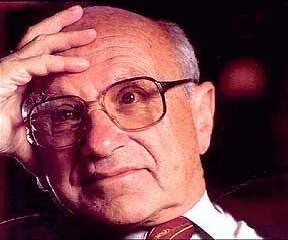Related Topics
..Tax and Fiscal Issues in the Constitution, Morris (1)
For some founding fathers, monetary issues were all that mattered.
Hospitals and their Future
New topic 2019-03-21 19:29:46 description
Competition for the Hospital, Rehab Center, and Nursing Home

|
| Milton Friedman |
Price Restraint by Competitors. Milton Friedman once devoted his Nobel Laureate speech to creating new price competition for doctors by removing their licensing requirement; naturally, many physicians were outraged. It seemed to them we saw plenty of competition between individual practitioners. Competition between Homeopaths and Allopathic physicians had a history of unspeakable viciousness in the Nineteenth century; it could not have been of benefit to the public. Competition between Optometrists and Ophthalmologists has created unanswerable quandaries about specialization without a preceding general medical background, about the limitations inherent in a superspecialized lifetime, and the conflict of interest between giving advice and profiting from products which implement the advice. On the whole, it takes one to know one, and the Hippocratic tradition of peer pressure may have been as far as surveillance can usefully go. Lately, however, the herding of solo practitioners into group practices (by insurance) may require some reconsideration of heightened issues of organized fee splitting, cross-subsidy, and the loss of personal responsibility. Universal government involvement in reimbursement will surely unbalance these old issues, and it would probably be wise for the government to hold back until we can see if its heightened interest in cost control improves matters, or worsens them.
Turning matters over to the trial bar, however, commercializes the motives of the investigator and provokes defensive medical behavior which is just as expensive as any negligence left in a practitioner after a decade of education. Healthcare institutions with business departments moreover have the uncomfortable incentive to use the price of hospital malpractice insurance as a major metric, thus exaggerating the role of plaintiff lawyers in escalating unwarranted defensive behavior within the institution. For a century we have observed more expensive institutions destroying less expensive ones, always using other descriptions of the process. Horizontal integration could be forgiven when more expensive hospitals shouldered heavy burdens of indigent care, but the 20th Century transfer of indigent care to the government also transferred much of the credit for it. Research is also mainly a governmental transfer of funds rather than a payment, with administrative costs a local bonus to be enjoyed rather than deplored. These disloyal viewpoints justify the proposal that more competition for healthcare institutions would be beneficial, at the fortuitous time that escalated construction costs discourage government funding of it, while private borrowing costs are essentially zero.
Teaching hospitals are unchallengeable the best place for delivering tertiary care, and must not be injured by mere reformist ideas. However, this function is probably underfunded at present, subsidized by inflated costs for so-called bread and butter medical care, transferred by cost shifting. Considerable cost savings are possible if this system is brought more in line with its true costs, but it must be done carefully. Having said that, it is surely true that much of the care delivered in tertiary institutions could be capably performed in less expensive institutions.
The Central Locus of Healthcare. When I started medicine, which was fifteen years before there was a Medicare, the doctors of Philadelphia tended to have their offices on Spruce Street. It was like, and it looked like, Harley Street in London. In time, doctors moved their offices to the campus of a nearby hospital, where they now can be found, using the parking lot and the laboratories, and seeing each other at lunch in the hospital cafeteria. I now propose that this hospital locus no longer serves, and should be moved.
Thirty major diseases have disappeared since this was entirely appropriate, and patients are a great deal older. The hospitals charge inordinately for sharing a bed in a room with a stranger; the last time I was a patient, no one gave me a bath or a back rub. All the nurses wore signs because you couldn't tell them from dieticians. The hospital is now threatened with fines if a patient is judged to have stayed in bed too long. On the other hand, if he goes home too soon and has to return, the hospital is also fined. The doctors tend to make rounds at 6 AM, because later than that the commuting traffic is horrendous. A profession of hospitalists has grown up because it isn't worth a doctor's time to come to town to see one or two patients. The whole medical complex is in the wrong place, driven there by third-party reimbursement.
I can't say what things are like in other cities, but in Philadelphia, there are at least fifty retirement villages scattered in the suburbs, filled with old folks. They all have infirmaries, most of them have drug stores and collection stations for blood tests. For the most part, what they don't have our doctors, x-ray machines and operating rooms. What they have in great abundance are sick old folks who need a lot of attention. I see no reason why the young folks with SUVs can't visit the doctors if doctors had their offices there, and x-ray machines will appear if there is a call for them by doctors practicing nearby. This complex probably needs a full-time ambulance or jitney to take people to the hospital for a one-day surgery, but after that, they can stay in the retirement village infirmary as long as they like. Imagine that; no one will find you for staying a month too long, in the judgment of a utilization clerk. Furthermore, it's all voluntary. Other places don't need to do it if they don't want to.
Originally published: Friday, April 19, 2013; most-recently modified: Wednesday, May 15, 2019